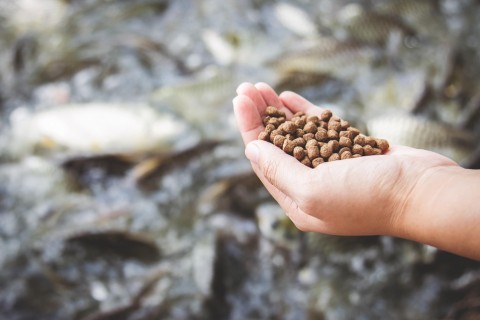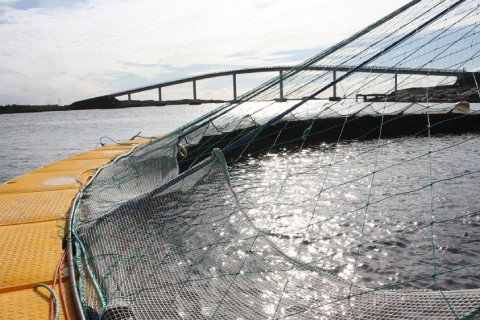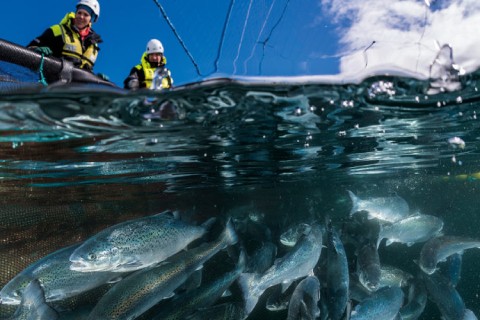Organic aquaculture actively reduces ecological impact and embraces sustainable practices. By adhering to organic standards and adopting natural farming practices, organic aquaculture promotes environmental protection, biodiversity, and community resilience. It plays a critical role in sustainable food production by fostering a more sustainable and resilient food system for the future. Additionally, organic aquaculture practices help minimize resource consumption, prevent water pollution, and reduce harmful methane emissions, thus mitigating climate change.
More ecologically sustainable fish farming practices are needed
The increasing demand for seafood and the stagnation of fishery catches have highlighted the critical need for more environmentally sustainable fish farming practices to meet the growing consumption needs. Here are some critical perspectives on the importance of transitioning towards sustainable aquaculture to address the demand for seafood:
-
Meeting Seafood Demand: To ensure a sustainable seafood supply to meet the rising demand driven by individual consumption patterns and population growth, there is a pressing need to address the challenge of meeting seafood demand.
-
Challenges in Wild Fish Stocks: The plateauing of fishery catches due to the decline in multiple fish stocks presents a significant challenge in meeting the increasing seafood demand. Overexploitation of wild fish populations has led to concerns about the long-term sustainability of fishery resources and their ability to support growing consumption needs.
-
Role of Aquaculture: Aquaculture emerges as a viable alternative to bridge the gap between seafood demand and declining fishery catches. As the primary source of seafood production, aquaculture offers a sustainable solution to meet the growing consumer needs for fish and seafood products.
-
Organic Aquaculture Practices: Transitioning towards more ecologically sustainable aquaculture practices is essential to ensure the long-term viability of seafood production. Organic aquaculture involves implementing environmentally responsible methods that minimize the impact on ecosystems, promote biodiversity, and reduce reliance on wild fish stocks.
-
Environmental Impacts: Unsustainable aquaculture practices can harm marine ecosystems, including pollution, habitat degradation, and genetic contamination. The industry can reduce its ecological footprint and promote conservation by embracing ecologically sustainable aquaculture techniques, such as organic feed and integrated multi-trophic aquaculture.
-
Innovation and Technology: Embracing innovation and technological advancements in aquaculture can enhance production efficiency, minimize resource consumption, and improve sustainability. Technologies such as recirculating aquaculture systems, genetic (selection, not modification) improvement, and digital monitoring tools are crucial in optimizing aquaculture operations while reducing environmental impacts.
-
Regulatory Frameworks: Establishing robust regulatory frameworks and standards for ecological aquaculture practices is essential to ensure compliance with environmental regulations and promote sustainable seafood production. Regulations related to water quality, feed management, disease control, and habitat protection are crucial for safeguarding the health of aquatic ecosystems.
-
Consumer Awareness: Educating consumers about the importance of sustainable seafood choices and supporting aquaculture practices that prioritize environmental sustainability can drive market demand for responsibly sourced seafood products. By fostering consumer awareness and transparency in seafood supply chains, the industry can promote a culture of sustainability and ethical consumption.
Transitioning towards more ecologically sustainable fish farming practices is imperative to address the growing demand for seafood while safeguarding marine ecosystems and ensuring the long-term viability of the aquaculture industry. By embracing sustainability, innovation, and responsible management practices, the aquaculture sector can play a pivotal role in meeting consumer needs for nutritious seafood products while preserving the health of our oceans for future generations.
Organic Aquaculture Linked to Organic Agriculture
Organic aquaculture shares its principles with organic agriculture, emphasizing natural feeds, eco-friendly practices, and animal well-being. However, it's important to distinguish between different aquaculture approaches regarding their impact on climate change.
Beyond Industrialized Practices:
While conventional, intensive, and super-intensive aquaculture can be linked to industrialized agriculture and its environmental drawbacks, sustainable aquaculture practices seek to minimize these harmful effects. They prioritize ecological health and reduce pollution, habitat destruction, and biodiversity loss.
Organic Aquaculture: A More Sustainable Choice:
Sustainable aquaculture encompasses a range of environmentally responsible and ethical approaches, with organic aquaculture being a specific example. It adheres to strict guidelines prohibiting synthetic substances, prioritizing natural feeds, and emphasizing ecological balance and animal welfare. This focus on natural resources and eco-friendly practices sets organic aquaculture apart from other forms, promoting biodiversity and mitigating environmental impact. Notably, organic certification verifies adherence to strict criteria, justifying potential price increases for responsibly produced, high-quality seafood.
Complementing, Not Replacing:
Organic aquaculture isn't meant to replace other forms of sustainable aquaculture. Instead, it aims to increase awareness about the different sustainability levels within aquaculture and encourage responsible practices. It can complement existing approaches and promote a shift towards more environmentally conscious seafood production.
Limitations and Transparency:
Indeed, aquaculture often relies on feeding ingredients linked to industrial agriculture. Organic aquaculture addresses this by aligning with organic agriculture principles and seeking sustainable solutions. By acknowledging these challenges and striving for improvement, organic aquaculture contributes to a more sustainable future for seafood production.
Organic aquaculture
is critical to increase organic food production because it aligns with ecological preservation principles. Here are some of the vital reasons why organic aquaculture is crucial for promoting sustainability and environmental integrity:
-
Environmental Protection: Organic aquaculture's emphasis on using natural resources and avoiding synthetic chemicals helps preserve the environment by reducing soil, water, and air pollution. The absence of artificial fertilizers, biocides, growth hormones, antibiotics, and GMO inputs minimizes adverse environmental impacts, contributing to ecosystem health.
-
Biodiversity Promotion: By creating habitats for native species, preserving natural ecosystems, and supporting biodiversity, organic farming practices associated with organic aquaculture play a vital role in maintaining ecological balance and conserving natural habitats. This promotes the coexistence of diverse plant and animal species in aquatic environments.
-
Efficient Resource Use: Organic aquaculture practices, including water conservation techniques, focus on optimizing water use efficiency to contribute to the conservation of water resources. These practices aim to minimize water wastage and promote sustainable water management in aquaculture operations, aligning with the goal of efficient resource use in organic aquaculture.
-
Local Economy Support: Organic aquaculture supports local economies and communities by promoting the production and consumption of locally-grown organic products. By reducing the carbon footprint associated with transportation and fostering resilient local food systems, organic aquaculture contributes to sustainable community development and economic growth.
-
Healthier Products: Organic standards in aquaculture ensure the production of high-quality seafood free from antibiotics, hormones, and synthetic chemicals. This results in healthier consumer products, promoting food safety, human health, and well-being.
-
Demand for Organic Inputs: Organic aquaculture operations rely on organic and sustainable inputs for fish feed to maintain the integrity of organic principles across the entire food production chain. This demand creates a market for organic producers, encouraging the growth and sustainability of fragmented organic agriculture systems.
-
Environmental Friendliness: Organic aquaculture systems are designed to minimize environmental impact by using low-impact feed, avoiding chemicals and antibiotics that can harm wildlife, and creating a more natural and healthy environment for fish. These practices contribute to the overall health and sustainability of aquatic ecosystems.
-
Economic Viability: Organic fish raised through sustainable aquaculture practices typically fetch higher prices on the market due to their quality and sustainability. This can benefit farmers economically and incentivize the adoption of organic aquaculture methods.
-
Disease Prevention: Organic aquaculture systems are less susceptible to disease outbreaks compared to conventional systems because they avoid using antibiotics and chemicals that can lead to the development of resistant bacteria. This proactive approach to disease prevention enhances aquaculture systems' overall health and productivity.
Organic aquaculture plays a critical role in sustainable food production by promoting environmental protection, biodiversity, and community resilience and producing high-quality, healthy seafood in an eco-friendly manner. By adhering to organic standards and adopting natural farming practices, organic aquaculture contributes to a more sustainable and resilient food system for the future.
Supporting Organic Aquaculture
Aquaculture, specifically organic aquaculture, represents a pivotal frontier in sustainable food production. Organic aquaculture initiatives face remarkable challenges in their establishment and scalability, primarily due to their unique production approaches and the urgent need for eco-scaling.
The interconnection between food production, environmental impact, and efficiency levels underscores the crucial role of innovative production strategies in addressing urgent eco-scalding requirements.
With global population growth stressing food supply security and limited natural resources, the decline in biodiversity and the escalating Earth's temperature further exacerbate the need for sustainable aquaculture solutions.
Organigogo's technological platform aims to revolutionize organic aquaculture by addressing establishment hurdles, expansion challenges, and the complexities of eco-farming adoption.
Organigogo strives to bridge the gap between high-demand food production and environmental sustainability by emphasizing regenerative and sustainable practices.
The Urgency of Scaling Up Organic Aquaculture
The global food system faces a critical challenge: meeting the growing demand for seafood while ensuring sustainable practices. Conventional aquaculture, though contributing to food security, often relies on intensive methods that harm ecosystems. Organic aquaculture offers a promising alternative, but its limited production necessitates urgent action.
Why Organic Aquaculture Matters:
- Environmental Imperative: Conventional practices can lead to pollution, habitat destruction, and biodiversity loss. Organic methods prioritize environmental health, minimizing these risks.
- Knowledge Transfer and Industry Improvement: Organic practices can catalyze innovation and improvement within the aquaculture industry. Organic farms showcase a viable path toward ecological responsibility. Farmers can learn and adapt these practices, gradually transitioning towards more sustainable methods.
- Building a Sustainable Future: Investing in organic research and development can lead to sustainable innovations that benefit both organic and conventional sectors.
- Organic Agriculture Synergy: Organic aquaculture can complement organic agriculture by providing sustainable sources of nutrients and inputs, creating a mutually beneficial relationship.
Organic Aquaculture: A Model for Sustainability
- Beyond Production: Organic aquaculture goes beyond yield; it prioritizes environmental and social well-being for future generations.
- Role Models and Knowledge Transfer: Successful organic operations can serve as role models, demonstrating the viability of ecological aquaculture and guiding conventional farmers toward more sustainable practices.
- Measuring and Amplifying Positive Impacts: Metrics like reduced greenhouse gas emissions and improved water quality can quantify organic practices' environmental benefits. Collaborative research and data sharing can strengthen evidence for organic practices.
By investing in research and development, sharing success stories, and fostering collaboration, we can establish organic aquaculture as a viable and scalable model. This, in turn, can lead to a more ecologically sustainable and equitable food system for all.




